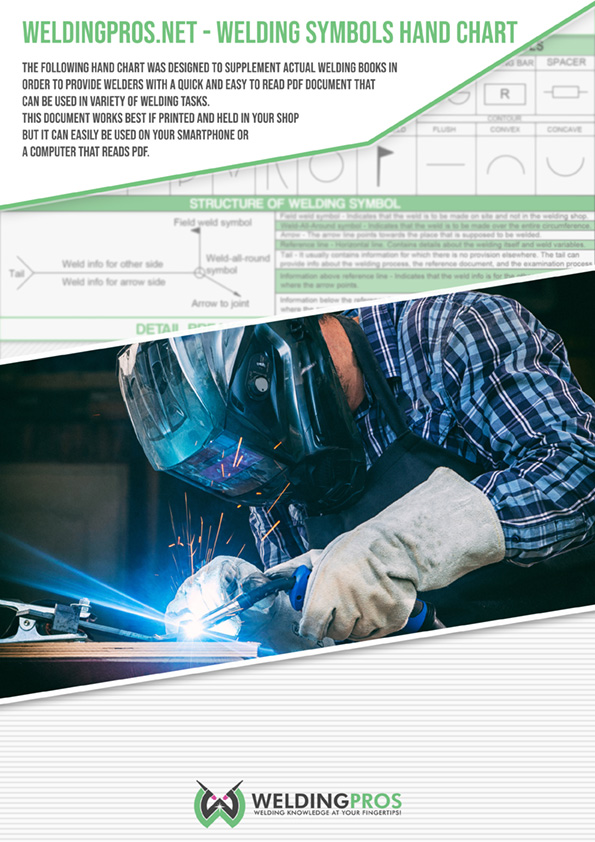Underwater welders are some of the most skilled professionals in the world of welding. Their pay scale can be lucrative given the right opportunities.
They perform difficult and skilled tasks in extreme environments and conditions.
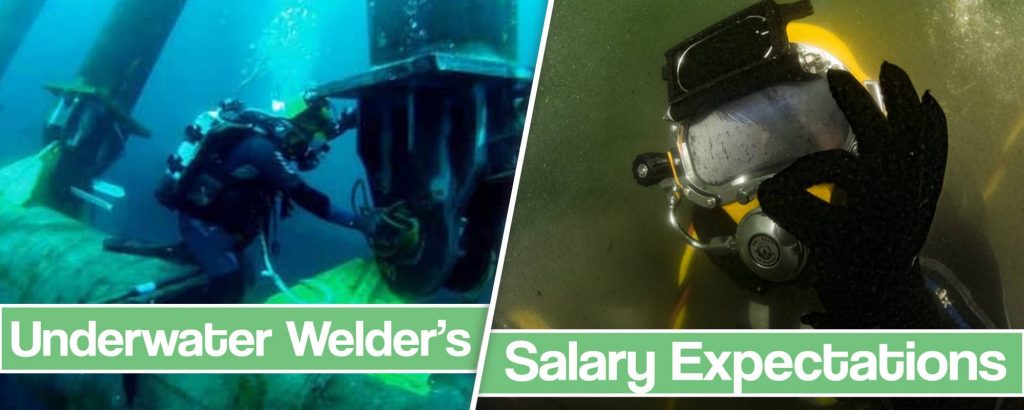
In return for the skill and services they offer, they are paid up to a six-figure salary. These niche professionals can expect to make up to $100,000 or more per year.
This is the type of career that will allow you to make a fair amount of money, along with travel and adventure. The rewards can also include more than mere pay. The job is interesting and exciting for many in the industry. Remember, these are the type of welders who build, repair and maintain ships for large corporations and governments around the world.
Underwater welders also help construct oil pipelines and platforms to keep up with the world’s growing demand for affordable energy resources. Without these skilled pros, the current economy would not be able to run as efficiently.
Underwater Welder Salary Breakdown
Underwater welders earn a lot of money no matter how you look at it. However, some earn way more than others. So, why is that the case?
Experience, dive depth and the danger of the job at hand are the primary factors. Now, while this is essentially the case, there are other factors that impact the amount of money you take home.
Let’s start by explaining offshore and onshore/inland underwater welders first and throughout all of the factors, you will see why essentially the dive depth, experience and associated dangers are the most important for a high underwater welding salary.
Subscribe: Get FREE 30 page PDF Welding Symbols Chart With Applied Examples for Each Symbol!
Offshore Welding
Many underwater welding professionals spend much of their time on marine vessels and oil rigs. They often have an intense schedule. These underwater welders often work 80-hour work weeks or more. Commercial divers might spend up to one month on the high sea before they come back inland. Also, they prepare the materials for welding and clean up afterward, which is a job in itself.
Expect to perform a lot of drilling support, wellhead installation and inspection, work on water vessels and stabilization of underwater oil pipelines.
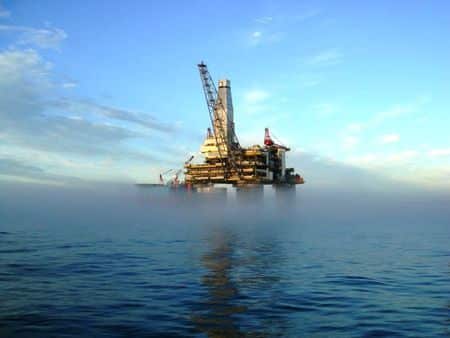
One caveat to note about being out to sea is that most projects and jobs end in winter due to tidal waves, hurricanes, and generally unstable weather. So a normal season runs from April to November, typically. As an offshore underwater welder, you can expect to earn approximately $40,000 – $100,000 annual wage and additional bonuses depending on the experience.
Inland Underwater Welding
Inland welding is mostly concentrated around rivers and lakes.
These underwater welding jobs are about work on dams, small ships, docks, and bridges, along with other miscellaneous projects.
Beyond welding in the freshwater, other jobs descriptions, duties, and tasks could include inspecting and repairing dam walls, cutting underwater debris, inspecting sewer pipes (HAZMAT), and more.
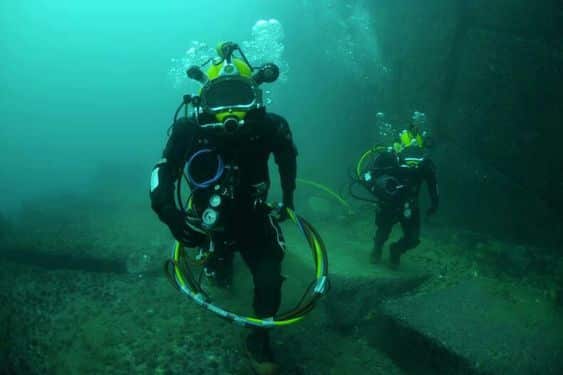
Inland underwater welding typically pays something like $40,000 – $80,000. There is less opportunity for larger payouts for onshore divers but your schedule would be a lot less intense, with fewer work hours. It’s a better choice for people who want to stay home with their family.
While the average underwater welding salary for inland underwater welders is lower than that of offshore diving welders and there is no depth pay bonuses, the fact that you can have a job year-round makes it very lucrative. Plus, taking that $80k underwater welder’s salary is still a big achievement.
Get Certified: The more certifications you qualify for, the better. You can expect higher pay and greater challenges in your field as a result of higher certification
Challenges to Training and Work: Like any serious career, you must meet all expected demands, criteria, responsibility, etc. to meet satisfactory or better standards.
Job Placement: The further from shore you travel, the more your pay will increase, generally speaking. This has to do with the risk you are exposed to.
Saturation Diving Underwater Welder Salary
Another factor to consider for extra pay is that underwater welders do not actually weld much below 15 meters, but much other maritime work takes place at this level and below.
Saturation diving, for example, is very competitive. Divers spend days or weeks doing lengthy dive projects in major water depths but the pay is very lucrative for saturation diving. That can be anywhere from, $1 to $4 per foot of depth in the sea, ocean or freshwater. It might not sound like a lot of money, but it will definitely add up.
A saturation commercial diver can earn up to $500,000. However, they usually earn somewhere between $100,000 and $300,000. It takes a lot of stars aligning to reach $500k but it is definitely doable.
Divers often work in depths of 500+ feet. Saturating body tissue allows them to stay under immense pressure for a long time. For any specific data on underwater welding salary, the Bureau of Labor Statistics comes out with a report each year and provides these statistics.
Experience and Knowing How to Use the Equipment
Most underwater welders start out fresh out of the commercial diving training and they work as a tender at first. Tender doesn’t dive. Your pay as a tender will be low but after about 3-5 years you will pick up the necessary experience to become an actual commercial diver.
You can’t jump into an underwater welding job without being a tender for a few years. This is where the experience talk comes in. As you pick up more of it, the higher you will be paid in your underwater welding career.
After you become an actual underwater welder, the diving experience income increase doesn’t stop. The more years you pile on, the more you will earn. However, as soon as you graduate from a tender to a commercial diver, your income will jump significantly and you will already be capable of 60-80k salaries.
Give it a few more years and employers will be paying up to 100k for offshore underwater welders.
Underwater welding equipment is also an important aspect of the job. The more complex situations you can handle, the more money you will earn. Working with AC equipment is much more dangerous than DC and sometimes it is necessary when commercial diving. This comes with an increase in pay.
Income and overtime pay
Due to the nature of work (especially for the offshore jobs), you can expect a lot of overtime (60 to 80 hours per week) and that over time constitutes a 50 percent increase in hourly wages, which is standard.
Since a lot of underwater diving jobs for commercial divers is seasonal, the overtime pay makes up for the lost working hours. This means that offshore divers work in advance so that they can rest during off season and enjoy their earnings.
Underwater welders must take advantage of work when and where the weather is acceptable and go back to their families for the winter months.

Difficult and Dangerous Underwater Welder Work Conditions
The more difficult and dangerous the job is the more money for underwater welders. Also, the higher chances that you may die so keep that in mind as well. Here is our article that tackles the topic of underwater welder’s life expectancy and death rate.
But commercial divers have no fear. As long as the money is good and all of the safety precautions are taken, you are good. You may still die, but if the precautions are in place, there is a smaller chance for it. This small chance translates into more money. Simple as that.
When you are doing any commercial diving in zero visibility, high current waters and in cold environments, your job will be extremely difficult and dangerous. Underwater welder salary in such conditions raises accordingly.
The Distance From the Shore
Offshore underwater welders earn more as they get further away from the shore. In a commercial diving career, you are constantly trading your safety for money. The further you are from safety the higher the welding salary. Every diving team has a diver medic and usually, there are onboard medics and medical kits but there is very little that can be done if you get seriously injured.
Multiple bone fractures, suffocation, organ damage, severe bends and other conditions have to be treated in a hospital. But the hospital is far away, sometimes too far away and even if you were boarded for an emergency helicopter ride, there still couldn’t be enough time.
That’s why, the further you go from the shore, the higher the underwater welding salary will be.
How to Become an Underwater Welder
Beyond training and certification specifically, you need a high school diploma or G.E.D. You will need to be physically fit for the job and pass a number of medical exams. During these exams, your heart, lungs, blood pressure and other important health factors will be evaluated.
It will come in handy to have some surface welding experience, but it is not required. Of course, there are great courses for commercial divers and welders where you will learn everything about diving, welding, safety and theory.
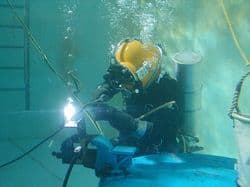
Education And Training Requirements
Learning to become an underwater welder can be challenging but education and training are minimal and much of the movement up the career ladder takes place after experience and knowledge are acquired with time. It is not as difficult to learn as you might think. It will take time and effort to master, however.
On the other hand, you must learn to become a skilled diver to get work in this field. There are many quality schools in the United States that specialize in both diving and underwater welding skills, techniques, and methods that you will need to learn to excel in a career as an underwater welder.
These schools and training costs will be an investment that will certainly pay off. If you want to earn a serious living doing this type of work, then you will need to consider location and availability.
Outlook for underwater welders
Underwater welding was previously among the most dangerous jobs but the recent technological advances in the industry have made the job much safer and easier.
No matter what the future has in store with automation, IoT, and robotics, underwater welding professionals currently help maintain the most integral components of many industries around the world.
Plus there is so much different work for underwater divers ranging from scientific diving to retrieval of sunken ship cargo.
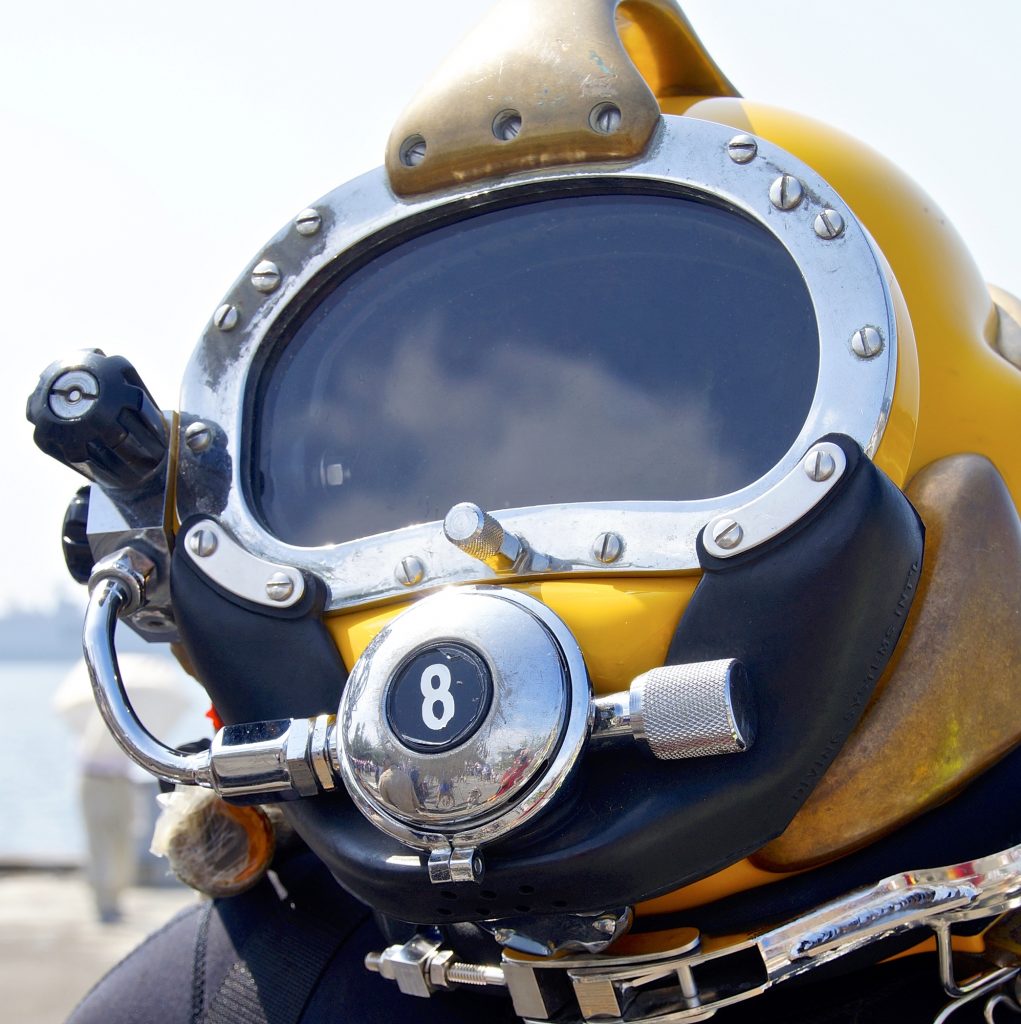
Until very advanced robots and automated machines can perform tasks with the most intricate level of dexterity, skill and performance, underwater divers will continue to be necessary for companies globally. Whether that’s scuba diving or actual deepwater work for saturation divers.
This is a job that comes with a lot of intensive labor, physical strain as well as psychological. Many divers would never do anything other than commercial diving regardless of the pain that comes with it. Regardless of what the future brings, this job is here to stay but like anything else, it is prone to changes.
Underwater Welder Salary Vs Topside Welding Salary
The average salary for surface welders is usually significantly lower than that of their underwater counterparts. Especially when we compare the surface welders with saturation divers’ mean annual wage.
This doesn’t mean that it’s always the case. Certified topside pipe welding experts can often outperform the underwater welders in terms of earning but no surface welder can outearn the experienced offshore underwater commercial diver.
Generally speaking, topside welders can outperform inland underwater welders specifically but not experienced offshore divers. Especially not saturation divers.
Conclusion
Underwater welding salary is definitely an attractive feat but you should think really hard if this is a career for you. Regardless of the dive methods, job title and whether you are doing inland diving or distance offshore diving. This is a lifestyle more than a career.
If it’s only about the money for you, then you might quit somewhere along the way. In that case, it’s better to open a welding shop and be a topside welder. You might earn less but with a good welding certification and skills, you can also earn a good salary.
While a saturation diver can earn an entire year’s salary of a regular surface welder, their job opportunities are far and few, this career path comes with a lot of pain and unless you find a deep sense of meaning in it, how much money you earn will not be good enough to keep you motivated.
Resources:
- https://www.commercialdivingacademy.com/
- https://www.diversinstitute.edu/
- Occupational Employment and Wages, May 2020 49-9092 Commercial Divers at U.S. Bureau of Labor Statistics




